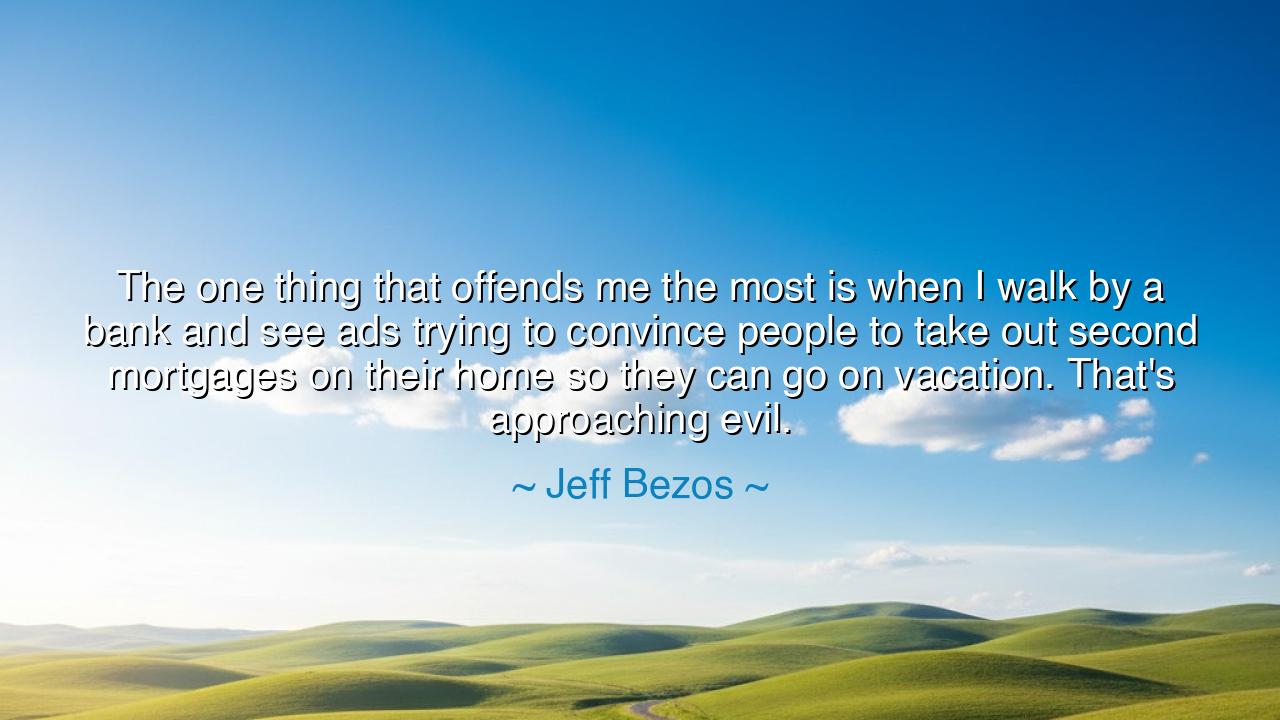
The one thing that offends me the most is when I walk by a bank
The one thing that offends me the most is when I walk by a bank and see ads trying to convince people to take out second mortgages on their home so they can go on vacation. That's approaching evil.






In the marketplaces of silver and promise, a hard saying is set like a boundary stone: “The one thing that offends me the most is when I walk by a bank and see ads trying to convince people to take out second mortgages on their home so they can go on vacation. That’s approaching evil.” Hear the weight of each word. A home is not a trinket; it is the hearth, the shield, the last citadel of a family. To yoke that roof to more debt for the sake of sand and postcards is to trade the foundation for foam. In this judgment there is not puritan scorn for rest—there is moral clarity about means: some joys are worthy, but not at the price of tomorrow’s shelter.
The bank and its gleaming ads stand here as figures for a broader temptation—the alchemy that turns longing into liabilities. The placard smiles: “You deserve it.” The ledger whispers: “You will pay for it twice.” A second mortgage is not a souvenir; it is a lien upon peace, an invitation to compound interest that eats like rust. When the message targets the soft underbelly of hope—urging families to stake their future on a fortnight of ease—the speaker calls it approaching evil because it preys upon trust, ignorance, and the human ache to be, for once, unburdened.
This saying’s origin lies in a founder’s creed of frugality and first principles—the habit of asking, “What end does this serve?” It is framed against a culture that treats consumption as sacrament. The rebuke is not anti-joy; it is pro-stewardship. Rest should restore the house, not ransom it. A vacation can be a meadow for the soul; but to mortgage the meadow itself to reach it is to salt the field for a single harvest.
Consider a story from a small town. A couple—call them Tomas and Eleni—were lured by a glossy flyer: “Unlock the equity in your home for the trip of a lifetime.” They signed. The ocean was beautiful; the bill was patient. Years later, a layoff turned the patient bill into a predator. The same bank that sold the dream now mailed the warning. Their daughter learned new words too young: foreclosure, delinquency, sale. The family did not perish; neighbors rallied; a stern repayment plan was forged. But the lesson burned: the true cost of a fortnight had been counted in years of narrow breathing.
History echoes the warning. In Rome’s late Republic, farmers pledged their plots for festivals and feasts during fat seasons. When lean arrived, lenders harvested the land; citizens became tenants on their fathers’ acres. The state discovered, too late, that a polity cannot be strong when its people sleep in houses no longer theirs. So the elders crafted grain laws and limits on interest—not to forbid celebration, but to keep celebration from devouring the roof.
What, then, is the wisdom to carve on our doorposts? First, that debt must serve assets that endure—craft, education, shelter—not fleeting display. Second, that persuasion married to asymmetry of knowledge (ads gilded by fine print) demands our suspicion. Third, that true rest is measured by the strength it returns to the family, not by the pictures it returns to the feed. Freedom tomorrow is worth more than sensation today.
Let counsel be practical and firm. Before any loan, write the purpose and test it against necessity and time. Build a sinking fund for joy—small coins set aside each month so that vacation comes without chains. Treat your home as a sanctuary, not an ATM; let equity be your fortress for winters, not tinder for summers. Teach children the liturgy of enough: repair before replace, plan before purchase, sabbath before spectacle. And to the stewards of banks and brands: aim your ads at wisdom, not weakness; refuse tactics that ask families to wager their shelter for a week of sun. Do this, and commerce will become clean again—profit without predation—and the hearth will outlast the brochure.






AAdministratorAdministrator
Welcome, honored guests. Please leave a comment, we will respond soon